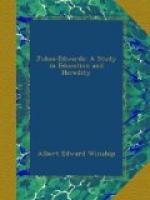The battle of Bunker hill aroused Burr to patriotic purpose, and, though but nineteen, he started for Cambridge to enlist. He was stricken with fever, however, and before he was recovered he heard of Arnold’s proposed expedition to Quebec, and, though he had better be in bed, he took his musket and walked to Newburyport, 30 miles, in season to ship with the troops. Two men were there ahead of him awaiting his arrival with instructions from his uncle to bring him back to New Jersey. This was too much for young Burr, who did not recognize the right of his uncle to interfere, and he expressed his mind so vigorously as to command the admiration of the soldiers and arouse the fears of the two messengers, who returned without him. This was the last of his uncle’s interference. Who that reads of the childhood life of this orphan can wonder that he lacked patience under the severe reverse of political fortune at fifty years of age? That he is the one illustrious exception among the 1,400 need cause no surprise.
CHAPTER VIII
CONTRASTS
It has already been emphasized that the Jukes always mingled blood of their own quality in their descendants, and that the Edwards family has invariably chosen blood of the same general tone and force. Who can think for a moment that the Jukes would have remained on so low a level if the Edwards blood had been mixed with theirs, or that the Edwards would have retained their intellectual supremacy if they had married into the Jukes. The fact is that in 150 years the Jukes never did mingle first-class blood with their own, and the Edwards family has not in 150 years degenerated through marriage.
It is pre-eminently true that a mighty intellectual and moral force does plough the channel of its thought and character through many generations. It would be well for any doubter to study the records of thoroughbreds in the animal world. The highest record ever made for milk and butter was by an animal of no family, and she was valuable only for what she could earn. None of her power went to her offspring. She was simply a high-toned freak, but an animal with a clean pedigree back to some great progenitor is valuable independently of individual earning qualities.
No more would any one claim that the Jukes would not have been immensely improved by education and environment, or that the Edwards family could have maintained its record without education, training, and environment. The facts show that the Jukes first, last, and all the time neglected these advantages, and that the Edwards family, with all its intermarrying, has never neglected them.
The Jukes were notorious law breakers, while the Edwards family has furnished practically no lawbreakers, and a great array of more than 100 lawyers, thirty judges, and the most eminent law professor probably in the country. James Bryce in his comments upon America places one of this family at the head of legal learning on this continent. This was Theodore William Dwight, LL.D., born in New Haven, July 18, 1822; graduated from Hamilton College, 1840; professor there 1842-58. In 1858 he went to Columbia College, organized the law school and was its president for thirty-three years.




